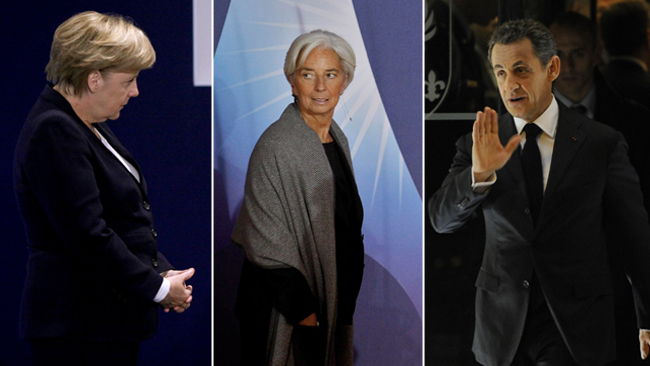Democrat November-December 2011 (Number 126)
Meet the Frankfurt Group
They are after your job - especially if you are a Prime Minister

In October at the Old Opera House in Frankfurt, Angela Merkel and Nicolas Sarkozy met the EU’s bureaucratic elite to celebrate Jean-Claude Trichet’s retirement from the European Central Bank, and went on to form a small group that wields power firmly but informally. They mean business.
Until recently it was unthinkable for the head of one European government to try and destabilise or depose another. But two EU leaders fell within days. As Sarkozy’s experience showed one need only give help to the rebels to enforce regime change. The group is not secretive. At the Cannes G20 summit its officials walked around with lapel badges saying Groupe de Frankfort,which met four times. When Merkel and Sarkozy were asked if they had confidence in Berlusconi, they put on those well documented wry smiles - and. Berlesconi was removed.
As part of the Frankfurt Group, the European Central Bank gave only minimal support to Italy which left the bond markets to do their worst to Berlusconi. The head of the International Monetary Fund was also at the Opera House that night, and made it clear it would be sending its auditors regularly to inspect the books in Rome. The unmistakable message was: we have ways of making you quit. And quit he did, to be replaced by one of their own: Mario Monti, a former EU commissioner.
When Merkel spoke she admitted frustration with European summits and their cumbersome democratic mechanics. “The EU’s ability to act and room for manoeuvre has proved slow and complicated,” she complained. “If we want to seize the crisis as an opportunity, we must be prepared to act more quickly and even in unconventional ways.”
Also in attendance was the new head of the ECB, Mario Draghi, an Italian with no love for Berlusconi. There too was Christine Lagarde, the new (French) director of the International Monetary Fund, who is in charge of bailouts and can impose humiliating conditions (as she went on to do to Berlusconi). There also was José Manuel Barroso, president of the EU Commission, and Olli Rehn. The omnipresent Jean-Claude Juncker, prime minister of Luxembourg and head of the seventeen-member euro group, was there, with the president of the EU Council, Herman van Rompuy.
So the Frankfurt Group is, in effect, a merger between the EU hierarchy and German financial power. It would not have been possible in the pre-crisis era, when there were qualms about German might. But now, “the question of who could accept a German model has been settled by the market,” as a German government spokesperson said recently. “We are really only talking about the details and the extent of the measures, not about their nature.” Papandréou set himself up when he decided to hold a referendum on the bail-out. He had recently berated the EU for “indecisiveness and errors.” He found out just how decisive the slimmed-down Frankfurt Group could be when he was denied any bail-out money, which hastened his replacement by Loukás Papadímos, a Frankfurt-trained former ECB official—one of their own.
Even Barroso had taken the remarkable step of destabilising Papandréou by calling for a coalition, breaking both protocol and the pretence that the EU Commission respected the sovereignty of its member-states.
Berlusconi was a harder target. He has dodged enemies for most of his seventeen years in politics, from the opposition to the Italian vice squad. Furthermore, Italy is not really broke. Strip out the interest on its debt and its books would not just be balanced but would have one of the biggest surpluses in the euro zone. Its prosperous north is one of the richest parts of the Continent, and its households are savers, with an astonishing €8.6 trillion squirrelled away.
It is not at all clear who considered Italy to be in crisis if the bond market charged above a supposedly fatal threshold of 7 per cent on its government debt. But one answer might lie in a declaration that Merkel made last year: “We must re-establish the primacy of politics over the market.”
This has become easier now that the euro zone has created a giant apparatus whereby the strings of power can be pulled by a handful of people. The euro bail-out fund, with its supposed €1 trillion of firepower,” has a staff of only fifteen. It might now be possible to wield immense power over a continent of independent states by assembling a few likeminded people in the back room of a Frankfurt opera house. And all in the name of European unity and protecting the euro!
The views of the first “Mr Euro,” Jean-Claude Juncker, on democracy are famous since he outlined the problem of government thus: “We all know what to do, but we don’t know how to get re-elected once we have done it.”
And the solution? You establish a group who were not properly elected in the first place and who won’t be seeking votes again. And have them do what you like.
But a prime minister chosen by foreign powerbrokers will be no more popular in Rome than he would be in Berlin. And already a third of Germans want out of the euro. That proportion will swell if Greece defaults within the euro. However, some politicians are speaking out and against but without explaining the true nature of what is in nothing less than a Franco-German coup.
Is that because of fear of the long shadow of the “Frankfurt Group”?